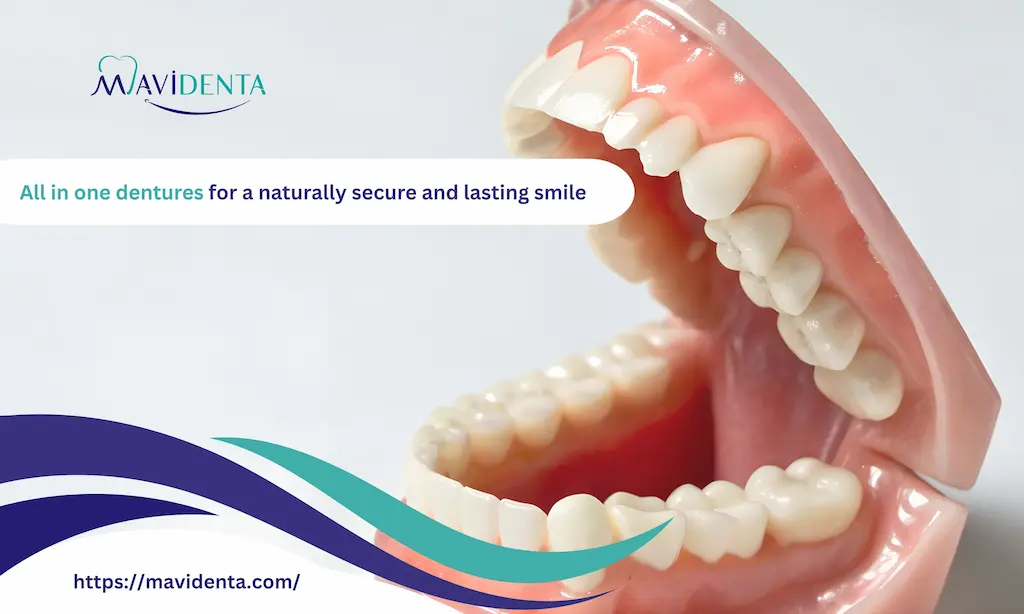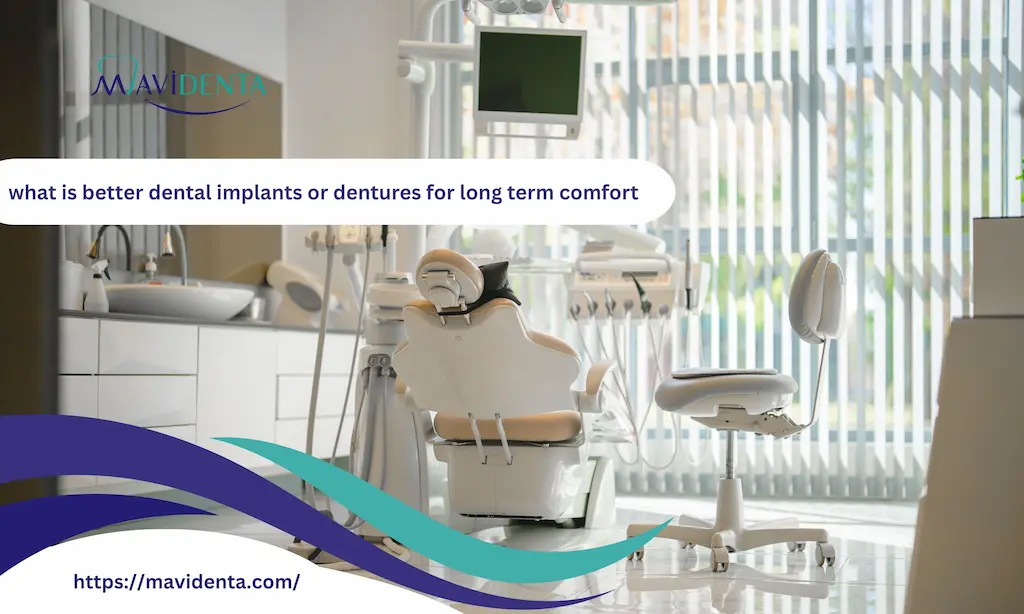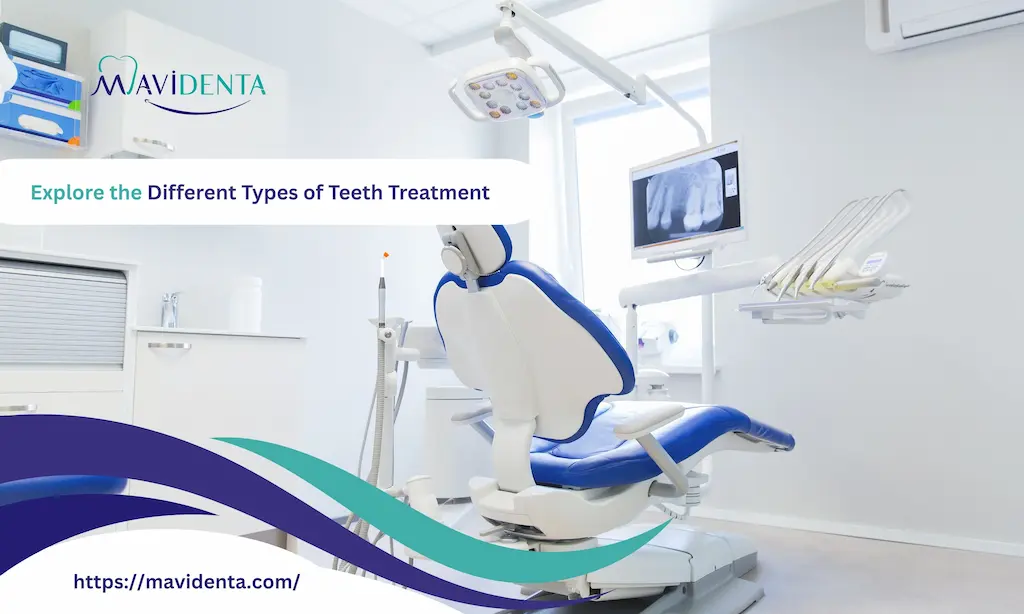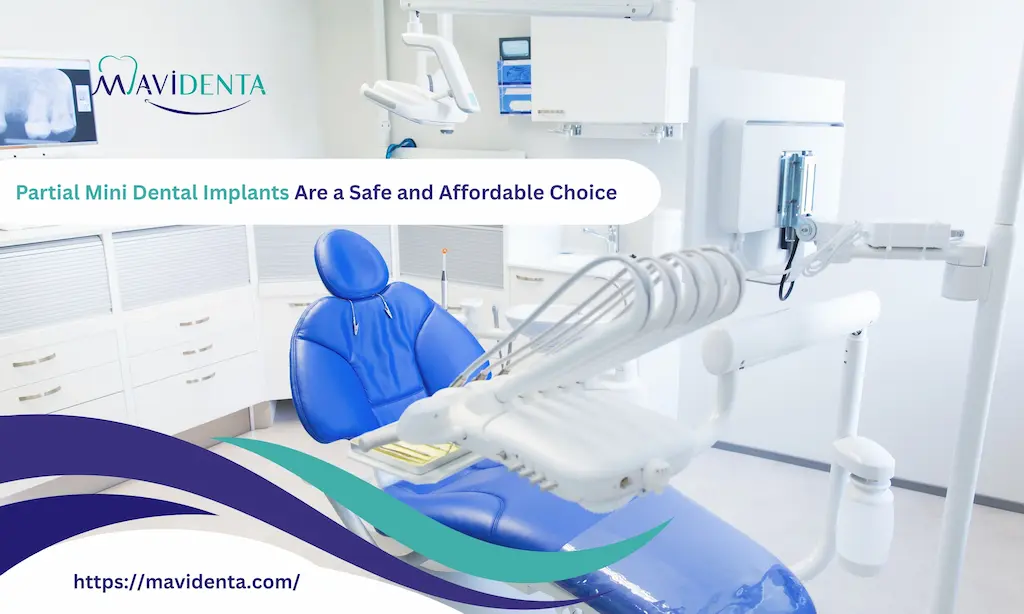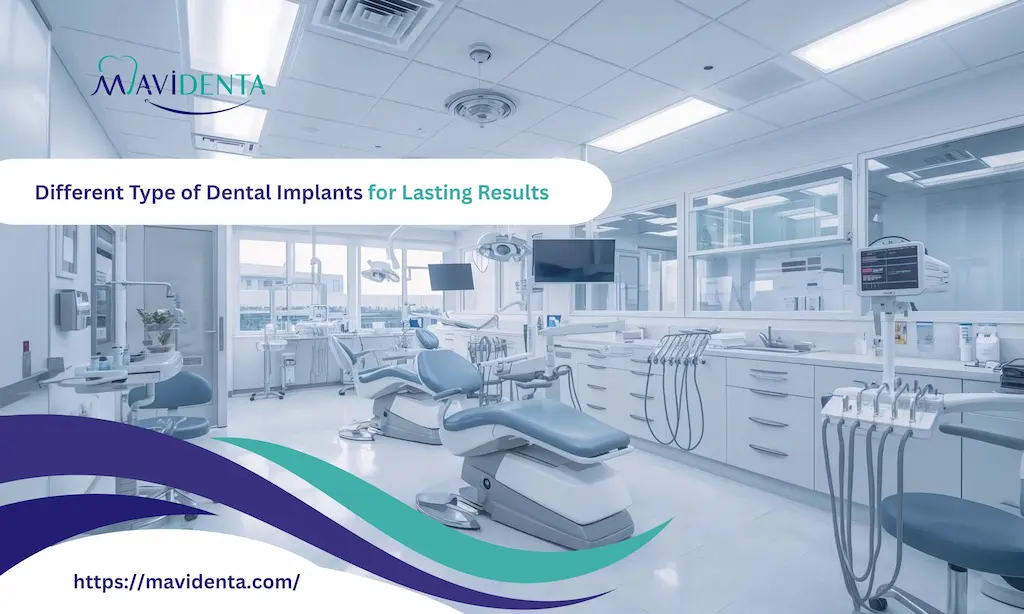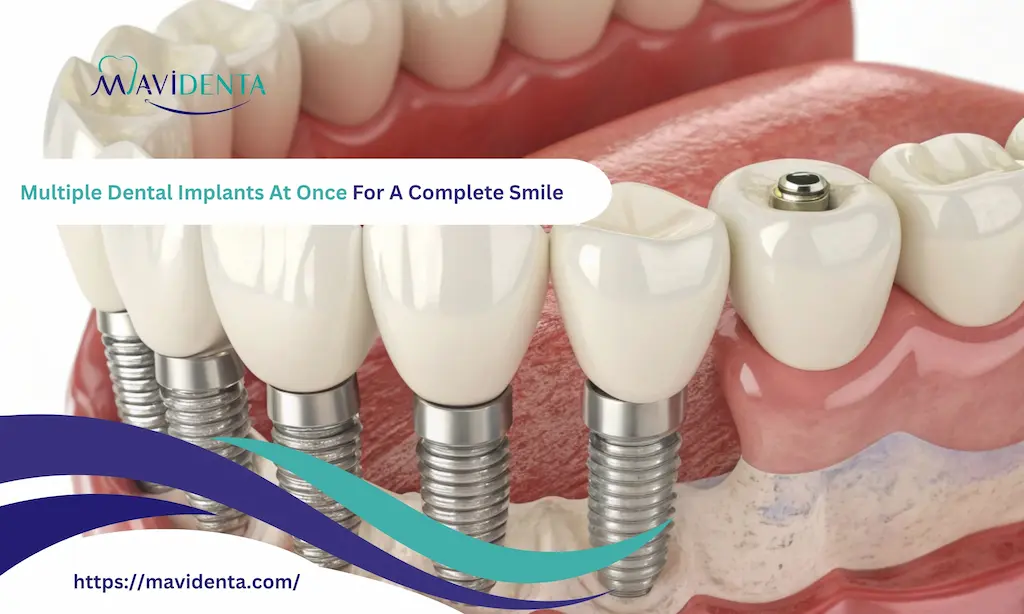A dental implant is a piece of metal that looks like a screw. It is placed on the jaw where the roots of the missing tooth are located. Over time, the bone grows around the implant and helps it stay in place. An artificial tooth or crown is then bonded to metal to fill the space left by the missing tooth. The crown is custom-made to look like the size, shape, and color of other teeth. So in the following paragraphs we will discuss can you get dental implants if you have no teeth.
Can You Get Dental Implants If You Have No Teeth?
The implant is placed in the place of the missing tooth, which after a while fuses with the bone, which can function like a natural tooth,
The implant can be applied in all cases of single edentulous deficiency, multiple edentulous deficiency, and complete edentulism. If there is not enough bone in the area where the implant will be placed, the implant can be successfully performed in many cases with bone strengthening procedures.
There is no situation where the body does not accept the transplant. The implant is made of non-oxidant materials. There are no reactions or allergies and no side effects to the implant.
Problems that occur after transplantation are usually due to proper planning, lack of appropriate treatment, or other problems related to the patients. The quality of treatment and oral health care for the patient is considered the most important factors for the success of the operation.
Read more: Get Porcelain Veneers Without Shaving Teeth
Replacing a full arch of missing teeth, does not have to mean wearing dentures:-
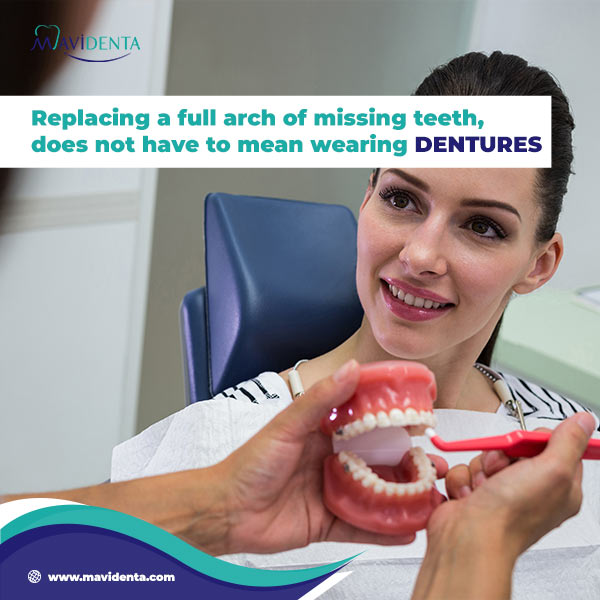
Can you get dental implants if you have no teeth? If you do not have a single tooth between your adjacent teeth, an implant can be placed in this area without scratching the side teeth, and a fixed tooth can be installed on the implant. In this way, your side teeth will remain intact, and the need for a bridge will be eliminated thanks to the implant.
There should be enough space between the teeth. The empty section will be able to close slightly over time as your remaining teeth move. Therefore, it is necessary that the dental implant procedure be performed before the teeth move from their place.
There are two types of removable dentures: complete and partial.
Read more: Partial Dentures for Front Teeth: A Guide to Choosing the Right Type
1-Complete dentures:
If you have lost all your teeth, complete dentures are the ideal solution. Two different methods are used:
The first method: is to use an immediate denture, which is ready immediately after the teeth are removed so that the doctor can place it immediately after removing the remaining teeth.
Immediate dentures are temporary until permanent dentures are installed.
After placing the temporary dentures, you will feel that they do not fit your mouth thoroughly, so some improvements are made until your permanent dentures are made.
The second method: If you do not lose all your teeth, the other option is to use traditional (permanent) dentures. In this case, the doctor removes the remaining teeth, prepares the mouth in advance, and then examines your mouth to see the changes.
During the period after tooth extraction, the gums shrink and change size, thus changing the overall size of the jaw so that he can make a custom denture that fits the size of your mouth. So, you will have to wait until the custom denture is prepared.
2-Partial dentures:
If there are a good number of remaining teeth, partial dentures are your best option, and they are also a financially convenient option if you are unable to afford dental implants.
After the dentist determines the measurements of your teeth, he sends them to a specialized laboratory outside the clinic where the artificial teeth are manufactured while preserving the empty space of the original teeth. In this way, the partial denture will fit perfectly with your natural teeth.
The dentist may resort to placing crowns on your real teeth if they do not look beautiful. But the decision to perform this operation is optional and depends on your desire.
Read more: dental implant dentures all on 4 vs all on 6
Alternatives to a fixed bridge:-
Speaking about can you get dental implants if you have no teeth? There are several factors to consider when choosing the most appropriate dental prosthesis for each patient. From budget, to the aesthetic or care aspect of these, there are many considerations before making the final decision.
budget:
The type of dental prosthesis determines the total treatment budget. One of the factors that directly influence the choice of a fixed or removable dental prosthesis is the price for it. This may be higher when treatment requires some type of complex intervention, such as surgery or intervention by a specialist.
The patient’s initial condition:
After analyzing the oral health condition, it is possible to know which possibilities suit the patient. Taking into account the number of pieces to be replaced, the specific location of missing or damaged teeth, and the initial area of the gums and jaw bone, treatment will be adapted to prioritize comfort and rapid recovery.
the expected results:
What results can the patient expect? In youth, aesthetics is a very important factor to take into consideration. Not so much when the parts to be replaced are in the background, looking above all for a job in chewing.
Professional specialty:
Depending on the professional helping the patient, their specialty may focus on placing certain types of dental prosthetics. That’s why it’s important to compare opinions and recommendations, to find the solution that suits each case.
Dental prosthesis care:
Can you get dental implants if you have no teeth? The type of care and maintenance is different for each type of dental prosthesis. While cleaning removable prostheses is easier by removing them from the mouth and washing them separately with specific products for dentures.
Caring for fixed prostheses requires more thorough cleaning with different oral hygiene products as recommended for native teeth. In addition to cleaning and fitting, there are other care for removable dentures that must be considered for ease of maintenance. Follow these helpful tips to improve comfort when wearing your prosthesis:
- After placing a new denture, follow a soft, carefully chewed diet until complete adaptation.
- Use a very strong adhesive fixative cream, and apply it correctly to prevent the prosthesis from moving.
- Like natural dental care, it is very important to clean your dentures after every meal, always with the help of a special denture brush.
- Carefully clean the mucous membrane and palate that is in contact with the prosthesis. Make gentle circular motions with the brush to massage and promote blood circulation.
- Remove the prosthesis at night so that the oral tissues can rest.
- Perform a deep cleaning of the prosthesis daily using effervescent disinfectant tablets.
- Prosthetics are very fragile. Handle them with care.
- Go to your dentist for regular checkups, and do not hesitate to make an appointment if you need an adjustment or correction on time.
- With proper care of removable dentures, it is possible to extend the life of these practical appliances. Taking care of and maintaining proper oral hygiene is even more important in prosthetic wearers, so that the oral tissues are healthy.
Read more: 3 Full Mouth Teeth Replacement Options in Turkey
Removable, implant anchored overdenture:-
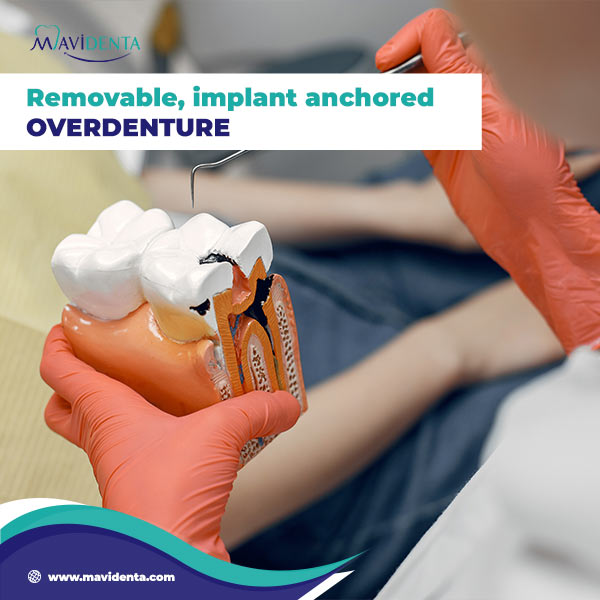
Removable dentures are artificial appliances designed to replace certain teeth and adjacent tissues, with the peculiarity that they can be placed and removed at will at any time.
Its purpose is multiple: restoring correct chewing that facilitates swallowing of food, improving dental aesthetics and, in some cases, also the wearer’s speech.
A removable oral prosthesis is always designed according to the needs and characteristics of each person’s mouth. They are unique, made-to-measure pieces that should be preserved and cared for properly.
In general, there are two types of dental prosthetics that can replace the natural function of damaged teeth. Before losing one or more teeth, and depending on the condition of the patient’s different oral tissues, it is necessary to make an evaluation of the most comfortable and effective system.
There are three basic materials from which partial dentures are made. Include:
Acrylic partial denture:
Acrylic is a popular choice among patients who choose partial dentures. The acrylic material can match the colors of different areas of the mouth easily. Therefore, it is pink at the base and resembles gum. As for replacement teeth, acrylic can also match the color of natural enamel.
The acrylic partial denture comes with a metal clip that holds the denture in place. These braces do not affect the aesthetic appearance of the replacement teeth. So, you don’t have to worry about this, but they are there to give your partial denture more stability and stability.
Metal partial denture:
Metal partial dentures have a metal base with a pink acrylic layer to give the gums a natural appearance. As for the teeth, they are made of acrylic to give them the color of the enamel. The metal base is cobalt and chromium.
Flexible partial denture:
The basic material for manufacturing flexible partial dentures is flexible plastic. The color of this type of plastic can easily be matched to the natural color of the gums and enamel. The clasp that holds the dentures is also made of plastic.
Read more: The Average Cost For Denture Implants
Removable full denture:
Removable dentures are an alternative to natural teeth that can be removed and placed as needed. Treatment to place them is cheaper, but in some patients it can be more uncomfortable and unstable.
The main reason a removable dental prosthesis is recommended is the lack of thickness or consistency of the jaw bone. If there is not enough bone or there is some disease, it is not possible to put on a fixed prosthesis, so the best option is to resort to an alternative method.
Removable dentures can be complete or partial, and can be made following the classic form of removal and placement, or they can be placed whenever the patient’s condition allows, as a denture over implants, known as a semi-fixed prosthesis. The latter is attached to the upper jaw bone on an anchorage, with the possibility of removing it when necessary, providing greater support and comfort.
Do dentures give you a natural feeling?
Unlike dental implants, dentures do not have anchoring roots, so nerve signals are not transmitted effectively through them. While dentures work to restore dental function, there are many things you must do to adapt to them.
The process of adapting to dentures will not take more than a few weeks for you to be able to train your mouth to eat with the denture on. In the first days, it is best to follow a diet that contains soft, easy-to-chew food. This will give you enough exercise to adapt to the denture. After that, you can eat various types of dentures. Other foods gradually until you return to eating normally.
But in general, there will be some daily restrictions imposed on you by using dentures, such as not being able to chew gum or eat food that requires a lot of chewing. In addition, it is not recommended to eat very solid or very spicy food because of its negative effects on the body. Dentures, dental health and safety.
Read more: Dental Implants Problems Side Effects: What You Need to Know
What to expect after denture placement?
The dentist will ask you to wear the dentures all day long and not to take them off at all during the first week. It is important for you to learn about all the aspects of the dentures that make you uncomfortable. It is possible that you will feel discomfort when wearing the dentures for the first time.
Here, you must determine the cause of the problem and work on it. Solve it. For example, your dentures may be too wide and move while you speak. Therefore, you must inform your doctor of all the details that bother you so that he can work on improving your dentures so that they are suitable and comfortable for you.
Conclusion
At the end of the text, many people ask whether can you get dental implants if you have no teeth? It is worth noting that there are several other alternatives to dental implants, such as full or partial dentures. To find out more details, you can contact Mavidenta.
FAQ
Am I eligible for dental implants if I have no teeth?
Eligibility depends on having sufficient jawbone density or undergoing bone grafting. Good overall health and controlled medical conditions like diabetes are important for successful implant treatment.
How many implants are needed to support a full set of teeth?
Typically, 4 to 6 implants are placed to support a full arch prosthesis, restoring function and appearance effectively.
Will I have teeth during the implant healing process?
Yes, patients usually receive temporary dentures or fixed temporary teeth to avoid gaps and maintain appearance while implants heal.
Do smoking and gum disease affect the success of dental implants?
Yes, active gum disease should be treated before implant placement, and smoking significantly increases the risk of implant failure and complications.



